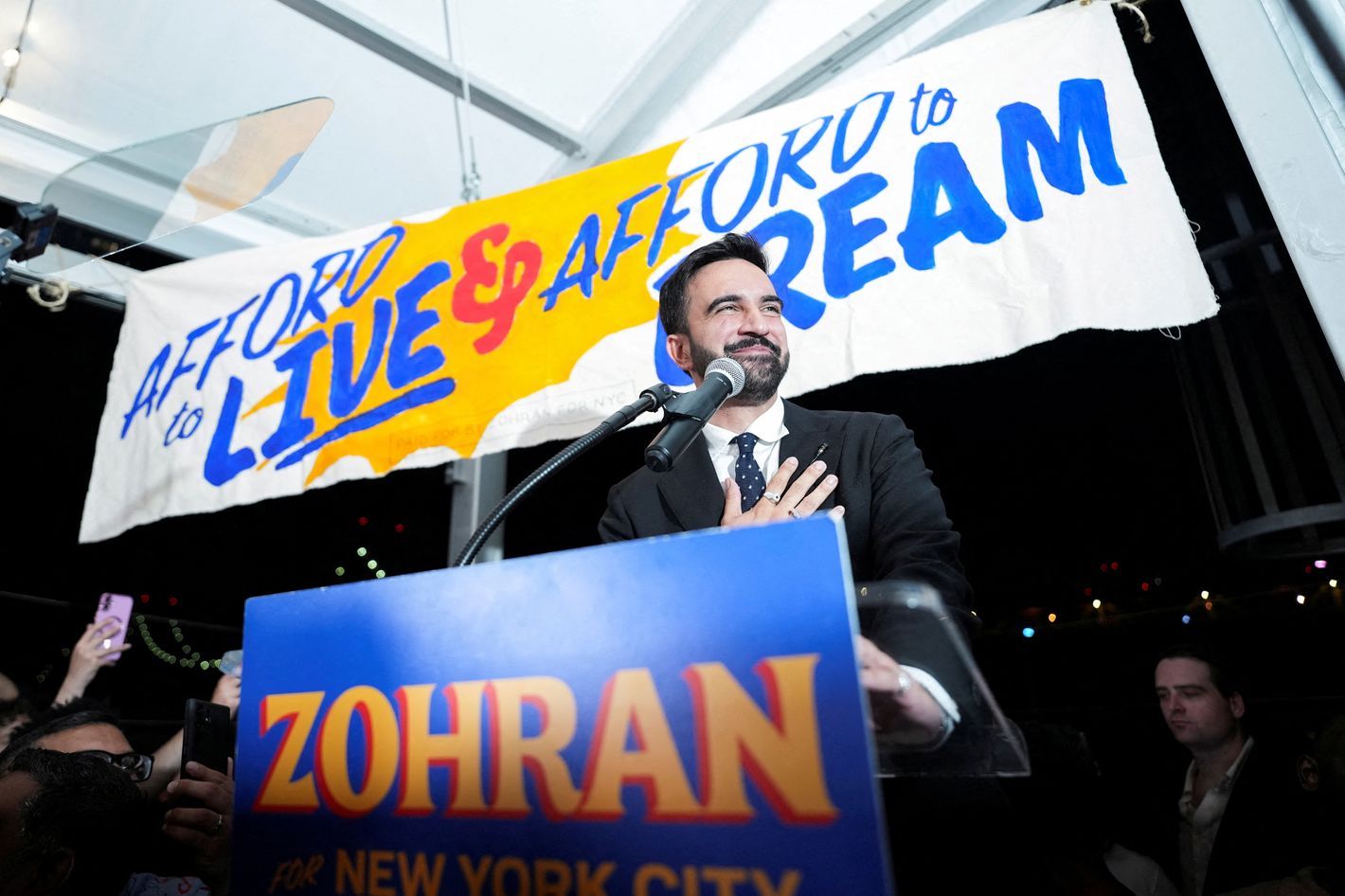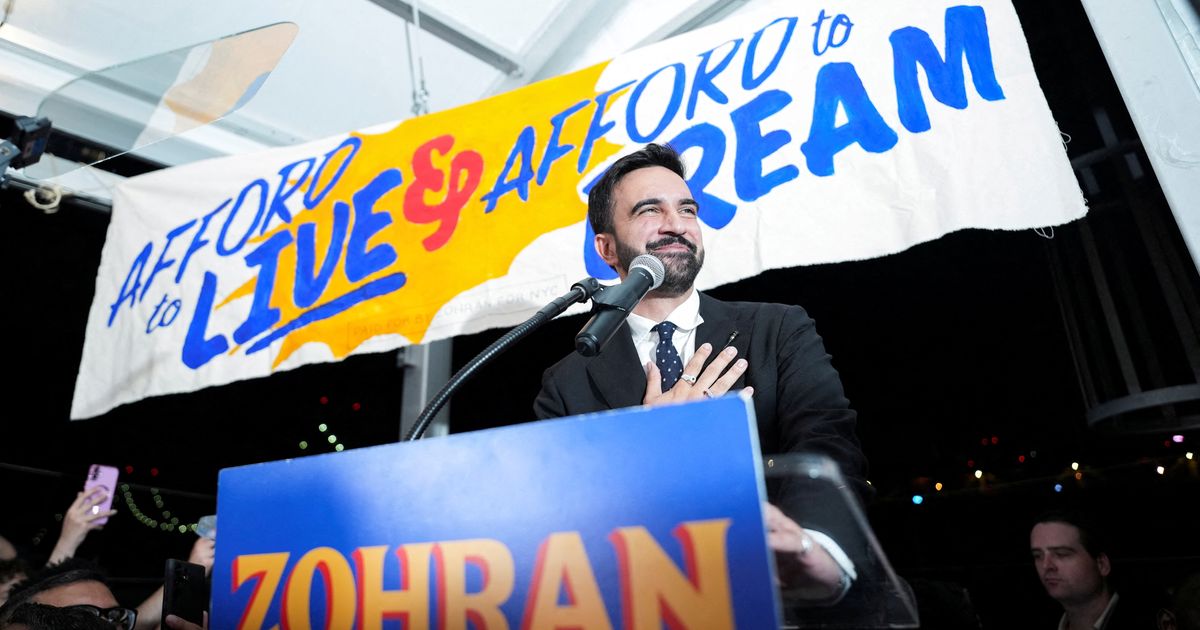 Photo: David Delgado/Reuters
Photo: David Delgado/Reuters
The sheer magnitude of Zohran Mamdani’s victory as the Democratic nominee for mayor was still sinking in for him a day and a half later. “We won College Point, Brighton Beach, Bensonhurst, Bath Beach,” he told me on the phone, ticking through neighborhoods known to be among the most right-leaning in the city. Power brokers across the party who had lined up behind Andrew Cuomo — the labor unions, county bosses, church leaders, and ward heelers — were now calling him, while business and real-estate executives burned up their own phone lines to figure out how to stop him in November.
Most of the party and the city’s elite had backed Cuomo, if reluctantly given his personality. The former governor had universal name recognition and a strategy to run a campaign much as campaigns had always been run in this city: Get labor unions and political machines on your side, raise a ton of money to blitz the airwaves and mailboxes with advertisements, secure the editorial boards, then roll out endorsements from party elders. Like many mayoral candidates before him, Cuomo would win by putting together a coalition of Black, Hispanic, Asian, and Orthodox Jewish New Yorkers alongside a smattering of whites — the same blocs that had propelled Eric Adams to a primary victory in 2021. There just simply aren’t enough college-educated liberals to propel one of their own to victory, the thinking went, never mind an avowed socialist, especially at a moment when the city was said to be increasingly Trump-curious thanks to concerns over crime and immigration.
Mamdani had a different theory. When he started off at close to zero percent in the polls as a 33-year-old Muslim democratic socialist from the backbenches of the State Assembly, his campaign seemed more like an effort at boosting his name recognition than an actual attempt at City Hall. Soon after Mamdani announced, Donald Trump reclaimed the presidency and took a considerable swath of the city with him. Two weeks later, Mamdani set out for Hillside Avenue in Jamaica, Queens, and Fordham Road in the Bronx, two areas that saw some of the steepest gains for MAGA. There, he asked voters why they had turned against the Democratic Party. The answers were familiar — the wars in Ukraine and Gaza, the skyrocketing prices, the fact that nothing seemed to change. The resultant video of Mamdani in coat and tie respectfully asking working-class New Yorkers of color about their politics went viral, garnering more than 3 million views.
It was a perfect encapsulation of how Mamdani would go on to win: Meet voters where they are, engage on the issues of material concern to them, come up with tangible solutions, then blast the whole thing out to the world.
“We have tried to listen more and lecture less, and it’s in those very conversations that I had with Democrats who voted for Donald Trump many months ago that I heard what it would take to bring them back to the Democratic Party — that it would be a relentless focus on an economic agenda,” Mamdani told me. “And when I asked those same Democrats who voted for Trump why they did it, what they told me again and again came back to rent and child care and groceries and even the $2.90 that it costs for a MetroCard, which is now out of reach for one in five New Yorkers. And the manner in which we have to respond to this is both to acknowledge it and actually put forward policies that would resolve it.” Mamdani channeled the same sort of outrage as Trump did but spoke in what he called “the language of affordability,” bargaining that voters would respond to his optimism by believing he would actually deliver.
The pain of spiraling costs has touched all but the very rich in the city, and it showed in the election results. Mamdani won not only working-class enclaves in the outer-boroughs but Hudson Yards, the Financial District, and Soho. Plus, strategists who worked on rival campaigns say, affordability became a stand-in for a general sense that the city wasn’t working very well, that the cost of living here — not just financial but the aggravation, the sense of disorder — wasn’t worth the benefits.
Mamdani broadened the circle of whom most New York campaigns speak to. His campaign believed that rivals were mostly playing for the same set of political insiders who all talk to one another, and among whom the standard of success is getting an item in Politico’s Playbook. He would reach out to the young and disengaged. The campaign ran ads during the Knicks’ playoff stretch, hoping to get New Yorkers to talk about him as they were feeling energized about what was happening on the court. Strategists flooded YouTube with ads, built a 45,000-person-strong volunteer army, and watched as supporters began cranking out all manner of homemade Mamdani swag, such as HOT GIRLS FOR ZOHRAN T-shirts. While Cuomo was almost running against the city — driving everywhere, seldom appearing in unscripted settings, and lacing his rhetoric with dark warnings about what a hellhole it had become — Mamdani exuded a gee-whiz joy about New York in his buzzy social-media videos featuring slice joints and bodegas and guys hanging out on the street playing dominoes. The city needed to be affordable, his messaging suggested, because that would make it easier to live here, and who wouldn’t want to live here?
Cuomo largely hit his turnout numbers, but Mamdani outran even his most favorable polls because thousands of new voters, the kind no pollster had reached, came out. This was the first city election in memory not decided solely by race and class but also by age. “From the beginning of the race, we said that we wanted to espouse a politics that required no translation, one that spoke directly to people’s lives, one that people could see their struggles in,” Mamdani said. “It’s about breaking out of the bubble of New York City politics into the world of New York City itself.”
Perhaps the greatest threat to Mamdani’s rise was the issue of Israel, which has emotional resonance for Jewish voters and especially the Orthodox, who often vote as a bloc. His campaign figured any hedging would not win him many Jewish votes but would cost him at a time when the public craves authenticity.
When asked in a debate where he would go overseas first as mayor, Mamdani replied he would stay right here in New York. A week before the election, when he was closing in on Cuomo in the polls, Mamdani declined to criticize the phrase “Globalize the Intifada,” which many Jews hear as a call to violence. Most observers figured he was cooked, and Team Cuomo couldn’t believe its luck, especially when Mamdani refused to back down. What he did instead was stick to his message.
“What you do in moments like that is you actually just respond to what every single New Yorker has told you is their top priority, which, time and again, is affordability,” he told me. “What I found time and again is that we have to have a politics that not only relates to the people of this city but also engages with them wherever they are, and that you have to be always able and willing to answer any question that comes to you. Because I think New Yorkers do deserve a mayor that they can see, that they can ask questions of, that they can even yell at, and navigate through any disagreement while understanding that there’s a shared humanity at our core.”
The political world is still struggling to make sense of him. Mamdani has been hailed as both a generationally talented communicator able to lead Democrats out of their post-Trump morass and trashed as a nepo baby determined to turn the city into a communist disaster. Moderate Democrats in swing seats distanced themselves from him almost immediately after his victory. Long Island representative Laura Gillen released a statement calling Mamdani “too extreme to lead New York City.”
But even as Trump was making Mamdani the face of the Democrats, strategists were thrilled by his ability to shed some of the party’s baggage on cultural issues in favor of an economic message. “Mamdani is a great example of how far you can go if you genuinely center your campaign in an engaging way around the issue that voters overwhelmingly say in surveys they care the most about,” wrote data analyst David Shor on X, linking to a video in which Mamdani interviewed halal-cart owners about how licensing forced them to raise prices.
Fearful of Mamdani, with his calls for free buses, free child care, city-owned grocery stores, and a rent freeze, all paid for by tax increases on corporations and the wealthy, the city’s one percent tried to map out how to respond. There may not be much they can do. All the money in the world didn’t save Cuomo from being smoked in the primary by someone who is just a few years away from a nascent career in rap music. If both Cuomo and Adams and Guardian Angels founder Curtis Sliwa run, as they all say they will, the anti-Mamdani vote will also be split. Adams has already signaled he is willing to go places Cuomo was not by calling Mamdani an antisemite and mocking his youthful campaign volunteers as outsiders who are gentrifying the neighborhoods of his working-class base.
Unsure how to proceed in the general election, the city’s C-suites are bracing for a Mayor Mamdani. “There is an ideology piece, of course, but there is also a competency piece,” said one real-estate exec. “It’s not as if City Hall has been functioning particularly well for a while now, but it takes a lot to get anything done in this town, and the fear is that he is going to make it that much harder. Who are the people he is going to bring in? I don’t think anyone knows.”
Business executives wondered if they should rally behind Cuomo or perhaps Adams, despite the taint of corruption and the dismal poll numbers. Never mind that almost anything Mamdani wanted to do would be constrained by Albany and that Governor Kathy Hochul has already said “no” to the tax increases his agenda would depend on. The executives expected respect.
“There is a lot of concern that he is going to be a divisive figure,” said Kathy Wylde, the head of the Partnership for New York City. “Words matter. Rhetoric matters. Mamdani has very effectively cultivated a constituency, but it is just one constituency in the city, and the question is, Will he scratch beyond that to address the concerns of other sectors?”
Now there is a new campaign that has to both persuade elites to not line up behind Adams or Cuomo and attract more people than voted for him in the primary.
“I hope to win their trust, and I hope to win their vote,” Mamdani said. “We can have the conversation.”
More on Zohran Mamdani
‘It’s Nice to Be Right!’Zohran Mamdani’s Win Prompted a Full-Fledged Elite MeltdownWill Democrats Learn Zohran Mamdani’s Lesson on Israel?
From Intelligencer - Daily News, Politics, Business, and Tech via this RSS feed


